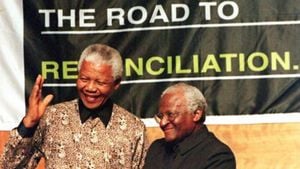Germany is on the brink of early elections after Chancellor Olaf Scholz faced significant political turbulence and lost the confidence of the Bundestag. On Monday, December 16, 2024, the Bundestag held a vote of confidence initiated by Scholz, aimed at affirming his leadership and moving toward earlier elections. The results were disheartening for the Chancellor: 394 members of the Bundestag voted against him, 207 expressed their confidence, and 116 abstained.
This significant lack of support not only marks the end of the government's current coalition but has also paved the way for the dissolution of the Bundestag, with early elections expected to be held on February 23, 2025. Scholz, who heads the Social Democratic Party (SPD), had previously indicated his intent to facilitate early elections following the collapse of the coalition government formed with the Greens and the Free Democrats (FDP) on November 6, 2024.
Majority Lost, Next Steps Clear
During the trust vote, which is significant because it was the sixth time such a vote was required since the establishment of the German Federal Republic, the Chancellor clearly missed the required majority of 367 votes. All SPD members present supported him, whereas the opposition parties, including the CDU/CSU and FDP, voted solidly against him. Surprisingly, three members from the Alternative for Germany (AfD) and three non-affiliated deputies supported Scholz, including the former FDP Minister Volker Wissing, who had resigned from his party.
Following the vote, Scholz immediately approached Federal President Frank-Walter Steinmeier to propose the dissolution of the Bundestag. Steinmeier now holds the responsibility to decide within 21 days whether to approve Scholz's proposal to dissolve the parliament—a decision expected soon, considering the urgency around the upcoming elections.
If Steinmeier agrees, new elections must be organized within 60 days of the parliament's dissolution, resulting in the proposed election date of February 23, 2025. Following the dissolution, Scholz's government will remain fully functional, governing as caretakers until new elections lead to the formation of a new government.
The Breakdown of the Coalition
The sociopolitical atmosphere leading up to the confidence vote has been charged. The coalition government, referred to as the “traffic light coalition” due to its red (SPD), yellow (FDP), and green (Greens) components, faced relentless challenges. A notable fracture occurred after Scholz dismissed Finance Minister Christian Lindner from the FDP, which initiated the collapse of the coalition, leading to discord over economic reforms and budgetary policies.
During the parliamentary debate preceding the vote, party leaders engaged in heated exchanges. Scholz positioned the vote as not merely about his leadership but as pivotal for the country's future. He stated, “The question of trust I pose today is one for all voters.” His appeals were met with fierce criticism from opposition leaders. Friedrich Merz, CDU’s main candidate for chancellor, declared, “Scholz no longer deserves trust” and targeted the Greens directly, calling them the face of Germany's current economic crisis.
The discord was palpable as political leaders prepared for the upcoming elections, indicating the electoral battle was already commencing. Scholz held the FDP responsible for the coalition's demise, arguing it resulted from their refusal to properly engage with necessary fiscal and investment strategies. He emphasized the need for the electorate to make fundamental decisions about the nation's direction.
The Road to Elections
The legal framework guiding the motion for early elections involves several procedural steps stipulated by the German Basic Law. Scholz's initial action to pose the vote of confidence was intended to trigger this legal process, ensuring the proper timelines are followed for dissolving the Bundestag and scheduling elections.
With the political discourse shifting, multiple parties are now gearing up for the anticipated election. Preparations are underway, with various candidates already announced and campaign strategies being refined. Each party is taking the chance to recalibrate their platforms and messaging as they vie for voter support.
Despite the political upheaval, the outgoing government remains capable of executing its duties. Until the new Bundestag is formed, Scholz’s administration will continue to make legislative moves. The challenges they face include passing necessary measures within the limited timeframe available, hoping to leave behind functional policies for their successors.
The upcoming elections will mark a significant moment for German politics, testing the electorate's response to the coalition's failures and the parties' proposed solutions for Germany's pressing issues.
Scholz's leadership will be under scrutiny as the campaign heats up, with every decision and declaration during this transitional phase likely to influence the outcome of the elections scheduled for February. Meanwhile, citizens remain watchful, aware of the potential shift in political dynamics and the direction their government may take post-elections.
Implications for the Future
Looking forward, the result of the upcoming elections could herald notable changes within German politics, especially with the backdrop of economic uncertainty and the legacy of the recent coalition's policies. The election will also serve as a referendum on Scholz’s leadership and the broader future of the SPD.
Whether voters will back Scholz again or lean toward the opposition remains to be seen as the political battlefield prepares for action.



